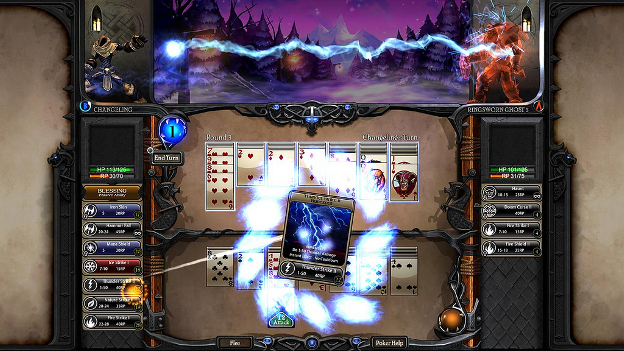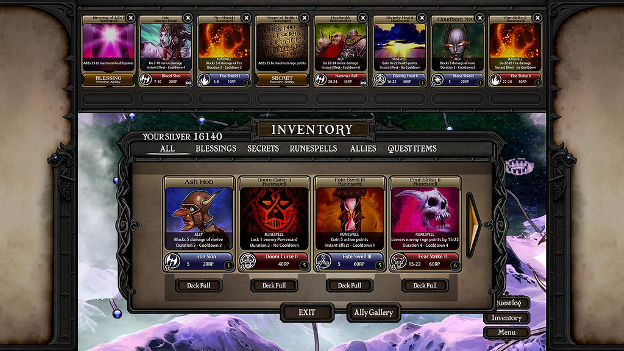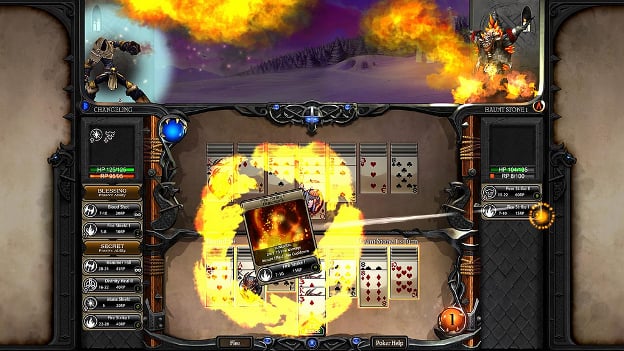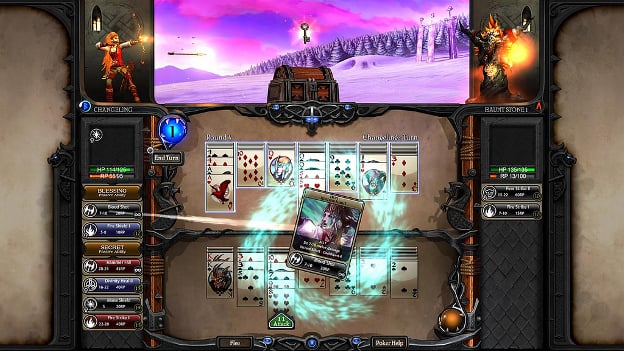Your Boss Will Hate You for It
Card games like Solitaire can be good ways to kill time when you’re stuck behind a computer. So long as your boss isn’t looking, that is. As addictive as they can be, they generally don’t offer any sort of character or story advancement. Runespell: Overture changes that, mixing poker and Solitaire with turn-based RPG combat and a medieval fantasy storyline. As strange as the concept sounds, this is actually a hard game to step away from.
Runespell: Overture tells the story of a mysterious Changeling who awakens in a blizzard without any idea of who he is or how he got there. He fights his way through some tutorials to a small camp, where he learns his fate might be tied to an ancient castle called the Skullgrim. He also runs into a mysterious woman who seems harmless at first, yet is perhaps hiding an ancient secret.

As you travel through the “Grim Whyte” toward the mysterious Skullgrim, you will meet several characters and partake in brief snippets of dialogue. You will sometimes have multiple response options, but you’re pretty much just deciding whether to be a mysterious—yet oddly agreeable—stranger or a cantankerous brute who just likes to whack things with a sword. Your choices will be along the lines of “I don’t want to fight you, but if I must…” or “Let’s fight, you miserable wretch. I will grind your bones into a powder, burn that powder, then feed it to the wolves.” Things like that. Your dialogue has no impact on the storyline, and, in fact, no impact on how people react to you. Of course, if you’re feeling exceptionally antisocial, you can hit the escape key to skip the conversation altogether.
The overworld map is composed of points of interest connected with lines representing pathways. It’s actually quite similar to the maps in games like Final Fantasy Tactics or Tactics Ogre. Some points on the map will have enemies to battle, and those are clearly marked. You won’t have to wonder whether traveling to a specific point will force you into combat, which is nice. And once in a while, defeating an enemy on the map will even cause new pathways to open.

My one complaint about the map is that I would like to be able to scroll it. The entire map doesn’t fit on the screen, and it stays pretty much focused on wherever your character is at the time. If you’re curious to see just how far these paths extend, you’ll just have to wait until you are able to actually go there.
But the real meat and potatoes of Runespell is the combat system. When you enter a battle, you and your opponent are each given a card setup very similar to a Solitaire opening. However, instead of lining up your cards in sequential order, you’ll match them to make combos based on poker hands—three of a kind, straights, flushes, full houses, and so on. Each combo has a number value assigned to it, and playing that hand will deal that amount of damage to your opponent. If there’s ever any confusion about the values of these hands, there’s a convenient little tab that you can click on to see how much combos are worth at any point during battle. (As a side note, there are multiple decks in play, so getting a five-of-a-kind is entirely possible.)

You are able to move any of your own cards that are face up, but you also have access to your opponent’s cards. For example, if you have a three in your stack, you can pull a three off your opponent’s stack to make a two-of-a-kind combo. However, you are not allowed to steal cards from your opponent’s combos. This brings an additional element of strategy, as you’ll be able to see the combos your opponent is working on and sabotage them. For example, if you see your enemy has three aces in a combo so far, and there’s another ace waiting to be added, you can steal that ace and place it into your own combo. It then becomes off-limits to your opponent. You can even set up “junk hands” specifically with the intent of stealing the cards your opponent is drooling over. Be careful though, you’ll be penalized ten points of damage for playing a junk hand.
Of course, aside from the traditional playing cards (ace of hearts, four of spades, etc.), you also can bring a deck of up to eight Power Cards into battle. Here, the game resembles Magic: The Gathering. Power Cards allow you to use buffs and debuffs, summon allies, and cast Runespells, which are your more traditional RPG spells like thunder, nature, and fire. Taking damage or dealing damage fills your RP (Rage Points) meter, and every Power Card uses a set amount of RP. Also, there is a Fear spell you can use to drain your opponent’s RP.
During each turn, you will be able to make three moves. Each move will allow you to either move a card or combo, play a completed hand to make an attack, or activate a Power Card. There are a couple exceptions to this three-move limit. You can cast a Fate spell, which will give you extra moves, or you can pass on your remaining moves and skip right to your opponent’s turn.

This game is almost purely built around this card battle combat system. With that in mind, the developers could have easily tacked on sub-par artwork and a clichéd RPG storyline and have been done with it. Instead, they put some serious love into these aspects.
First of all, the art style is very effective. During battle, you will see an animated 3D model of your character and your opponent. While these are superbly designed and animated, they are the only polygons you’ll see in the game. But that’s not a bad thing; the rest of the art in the game is expertly hand-painted. The character cards look great, and even the backgrounds in the camps you’ll visit are exceptionally well done. There are a few animations added to the scenery here and there—mostly just details like falling snow and dancing flames—and those meld with the art style perfectly.
Second, the story is actually pretty intriguing. Sure, there are a few clichés here and there and the dialogue is cheesy in a couple places, but overall, it’s a fantastic story. Instead of a fabricated fantasy world, it’s actually set in Medieval England, though fantasy elements like magical spells and immortal warriors are common.
Third, the audio is also fairly well done. It’s certainly not the game’s strong point, but the music is appropriately epic. Hearing the clank of swords coupled with the traditional “shuffling” sound found in many PC card games is actually very satisfying. It keeps you firmly planted in both the fantasy world and the strategic playing card world.
The only real complaint I have—besides the non-scrolling map mentioned earlier—is that the game has no multiplayer mode. PvP battles in Runespell would have been an excellent addition, as trying to sabotage your friends’ hands could lead to some extremely deep strategic gameplay.
Tactical RPGs and Solitaire might not sound like they should mix well, but Runespell: Overture is surprisingly addictive. Even when you lose a match, it’s usually only by a small margin, giving you that “I know I can win this next time” drive to play just one more round. With a fairly robust campaign and a bunch of achievements to earn, Runespell holds its own as a card game. There’s even a New Game Plus option so you can play again with all the Power Cards you’ve earned (with the exception of character cards.) Is it worth $10 for the download? Absolutley.
One word of warning, though: If you install the game on your office computer, don’t expect to get very much work done.
RATING OUT OF 5 RATING DESCRIPTION 3.9 Graphics
Runespell doesn’t have much for polygons, but it does have a great art style. Characters, cards, and backgrounds are lovingly hand-painted. 4.1 Control
Basic point-and-click controls. If you’ve ever played a card game on a computer, you’ll jump right in. 3.2 Music / Sound FX / Voice Acting
There are no voiceovers, but the music is appropriate and the combination of RPG-like sword-slashing and the familiar Solitaire card-shuffling sounds blend well. 4.5 Play Value
For $10, the five-plus hour campaign alone is a great value. You’ll most likely come back for a New Game Plus to earn the achievements and Power Cards you may have missed, or maybe just to experience more of the addictive combat. The only complaint: no multiplayer. 4.1 Overall Rating – Great
Not an average. See Rating legend below for a final score breakdown.
| Review Rating Legend | |||
|---|---|---|---|
| 0.1 – 1.9 = Avoid | 2.5 – 2.9 = Average | 3.5 – 3.9 = Good | 4.5 – 4.9 = Must Buy |
| 2.0 – 2.4 = Poor | 3.0 – 3.4 = Fair | 4.0 – 4.4 = Great | 5.0 = The Best |
Game Features:
